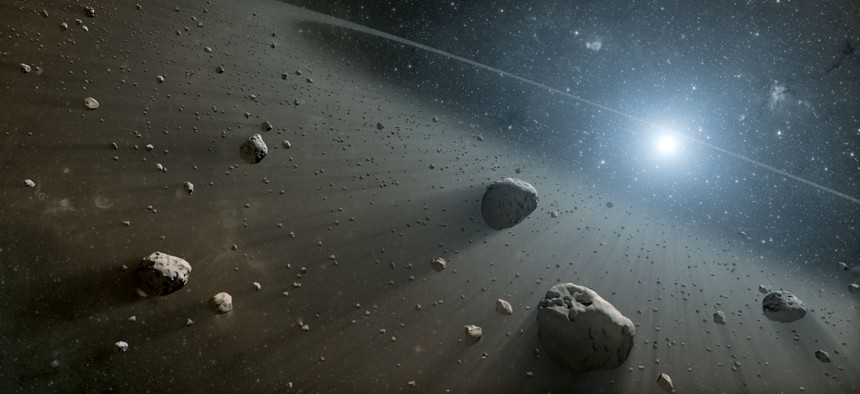
NASA illustration
Congress Has Passed the First American Space Law for Asteroid Mining
Space law isn't just for governments anymore.
For aspiring asteroid miners—there are more than you think—the challenges of extracting metals from the inner solar system go beyond the fuss of getting prospecting platforms into space. There areimportant legal considerations, too.
Existing space laws were written for governments, since at the time of their writing, governments were the only entities capable of going to space. The 1967 Outer Space Treaty, for example, dealt mainly with desires to keep nuclear weapons out of orbit (it came at the height of the Cold War) and to deter a potential “colonial competition” in outer space. When it comes to property, the laws currently on the books simply say that nations cannot claim sovereign territory in space, and that they are responsible for any space activities by their nationals.
But now that an increasing number of private actors are getting to orbit and aiming to set up shop there, new rules are needed to give investors the certainty that profits earned in space will be protected by governments back here on Earth.
With a vote in the US Senate yesterday (Nov. 10), Congress has OK’d a bill that lays out Americans property rights in space, a move that has thrilled aspiring space entrepreneurs—even as critics fear that it may grant too wide a mandate for orbital speculators.
The bill says that US citizens can own, transport and sell “any asteroid resource or space resource” obtained during commercial operations in space. Asteroid mining concerns like Planetary Resources are comparing it to historic US legislation that opened up the frontiers.
“Long ago, The Homestead Act of 1862 advocated for the search for gold and timber, and today, H.R. 2262 fuels a new economy that will open many avenues for the continual growth and prosperity of humanity,” Chris Lewicki, Planetary Resource’s president and chief engineer, said in a statement.
Earlier versions of the legislation raised fears that the rest of the planet wouldn’t be as thrilled; the White House warned that the bill might violate US international commitments. One controversial section of the bill would have granted “non-interference” rights to any ongoing space operations, which critics said came too close to the US granting a permanent claim on space resources—one that might spur the kind of global race for space territory feared at the dawn of the rocket age.
That section was cut from the final version of the bill. But there is still a hard slog ahead to figure out what to do if, say, US and Chinese space mining companies wind up with competing claims to the same space rock.
The current bill still comes with one major flaw, according to space lawyer James Dunstan. He says the legislative language is too vague around what it means to “obtain” a space resource, which Dunstan fearswould allow creative attorneys to “claim a new kind of intellectual property in data about space resources they have merely surveyed from afar. That’s essentially a mining claim—but without any of the use-it-or-lose-it constraints and time limits of traditional mining law.”
You can imagine the mess of conflicting claims and court cases that might ensue. The stop-gap solution Dunstan suggests is having US president Barack Obama issue a signing statement saying his administration will interpret the bill to mean resources “physically obtained” by US citizens.
The White House has yet to comment on whether Obama will sign the bill.
NEXT STORY: CBO Has Overestimated Revenues Since 1982







